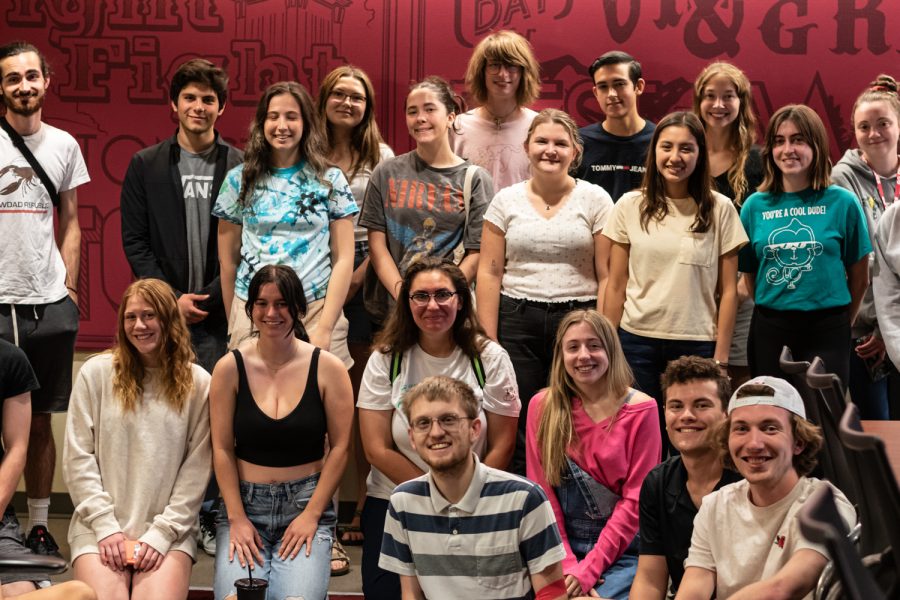ESA pushes back against fossil fuel investment
Petition has gathered 699 signatures as of Wednesday
Members of the Environmental Sustainability Alliance pose for a photo during a meeting, Oct. 6.
October 13, 2022
After developing its petition last year, WSU’s Environmental Sustainability Alliance is planning to march to WSU President Kirk Schulz’s house to discuss fossil fuel divestment.
“Basically what that would be used for is showing WSU administration that students are actively supporting this and that the people who are paying their bills, who are paying tuition to WSU don’t want that money to be used to fuel climate change,” said ESA Chair Stevie Fawcett.
The climate march is slated for Oct. 27 from 11 a.m. – 1 p.m, he said.
Fawcett said the ESA will be tabling outside of the Compton Union Building from 11 a.m. – 12 p.m. with some signs and speeches on fossil fuel divestment along with donuts and flyers to hand out to students.
“Hopefully we’ll have some conversations, let people know that this is a campaign that’s happening, tell them how they can help, how they can spread the word,” Fawcett said. “If they have questions about what is our goal, how this will affect me, anything, we wanna have those conversations as well.”
From 12-1 p.m., the ESA will be marching to Schulz’s house.
Fawcett said the basic premise of the petition, which has gathered 699 signatures as of Wednesday, is to separate WSU from fossil fuels, but that the heart of the issue is fossil fuel divestment.
“Basically it’s the opposite of an investment, meaning that WSU currently has financial holdings in fossil fuels and fossil fuel companies, and what we’re trying to do is show that students don’t want that,” Fawcett said. “Obviously, that’s a contribution to climate change, which is a huge global issue.”
He said the ultimate goal of the petition is to show support for divesting from fossil fuels and reinvesting the school’s funds into more sustainable energy sources.
“The fossil fuel divestment campaign itself began just over a year ago, and originally it was just a few people,” Fawcett said.
He said that two representatives from Citizens’ Climate Lobby, including one WSU faculty member, presented the idea of fossil fuel divestment to ESA members last year and discussed how it had been done at other universities.
“We went through a couple ideas … and what we ended up realizing was that we would need to demonstrate pretty strong student support, as well as faculty support,” he said.
Fawcett said last school year, sometime during the late fall or early spring, the ESA opened their petition because of a survey they conducted a couple of weeks prior, which showed that out of just over 1,000 responses, 70% of student respondents were in favor of fossil fuel divestment.
“That showed great support, and from there, we went on and made a petition where students could actually demonstrate their support by signing their name and saying why they’re interested in this campaign and why they support it,” Fawcett said.
He said the eventual goal is for WSU to pull its funds out of the top 200 fossil fuel companies and that the ESA would like to get as many signatures on the petition as possible, with a goal of 1,000 signatures being the minimum.
Fawcett said the petition is a way for students to show their support for fossil fuel divestment even amid busy schedules.
“In order to address this problem [of climate change], socioeconomic strategies kind of goes along with it,” he said. “You’re not going to convince a lot of people to tackle climate change by basically going bankrupt. Electric cars are a great example of this kind of switch that we’ve seen in the last 20 years … it’s because that’s sustainable and it’s profitable now because people are paying attention to this issue and they want to do something about it.”
Fawcett said divestment is important because as the world transitions to sustainable energy, fossil fuel companies will be generating lower revenue, so divestment would align with economic trends.
Mason Burns, ESA graphics designer, said he joined ESA to gain more knowledge on environmental impacts within WSU and to help reduce these environmental impacts.
“I’ve been doing some of the graphic design for the [petition’s] posters, as well as trying to get the word out using the residence halls,” Burns said.
He said Pullman primarily deals with agriculture, and the area has seen an increase in uncontrolled wildfires and reduced crop growth due to drought, revealing the scope of climate change’s impact on the Palouse.
“From a student standpoint, I think WSU really needs to focus on the future of the students and not just providing them to the end of graduation, providing the hope that okay, once you graduate, there’s some type of safety net and future,” Burns said.
He said the progress of the petition has been slow, but the reaction from WSU has been responsive.
“Again, it comes down to whether or not WSU wants to fully focus on it, but they say they have started to take steps, which is big progress, but at the end of the day, it comes down to whether or not they put their words into action,” Burns said.










